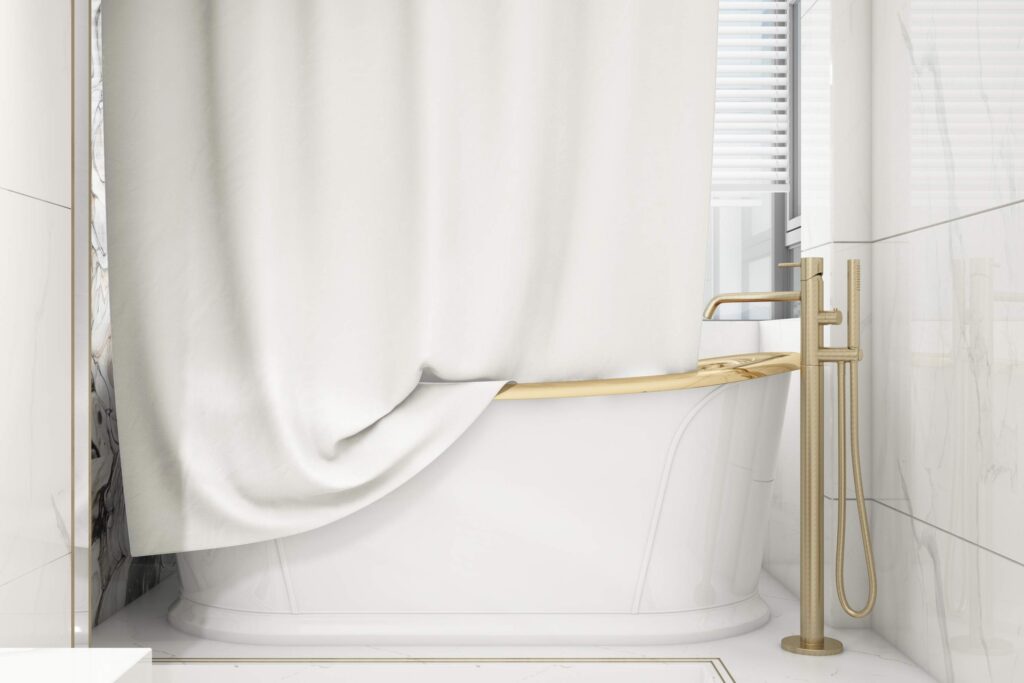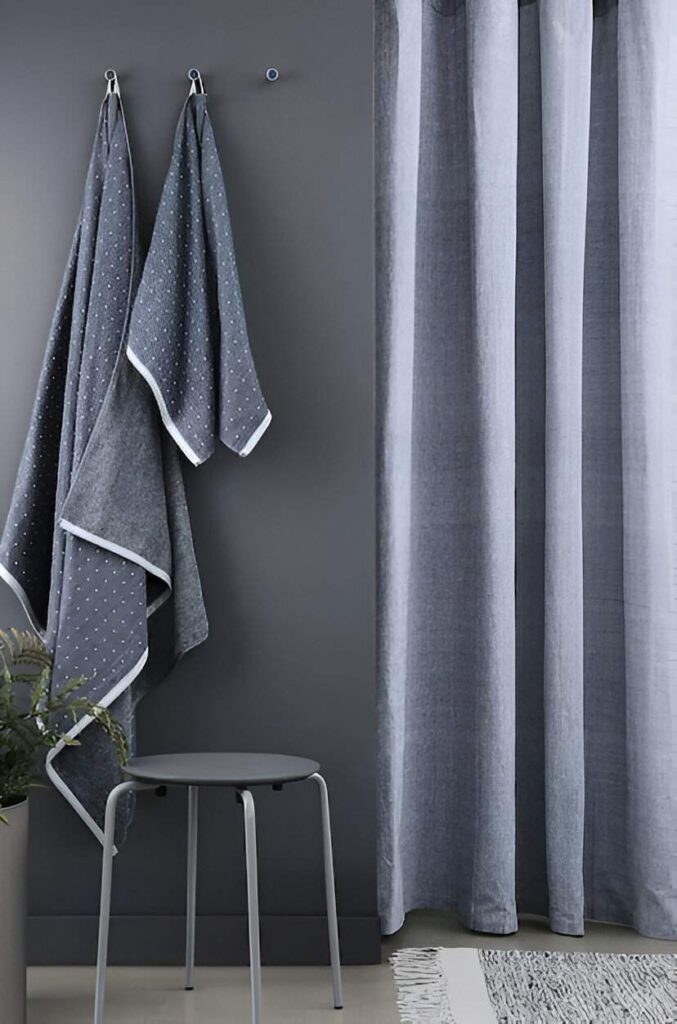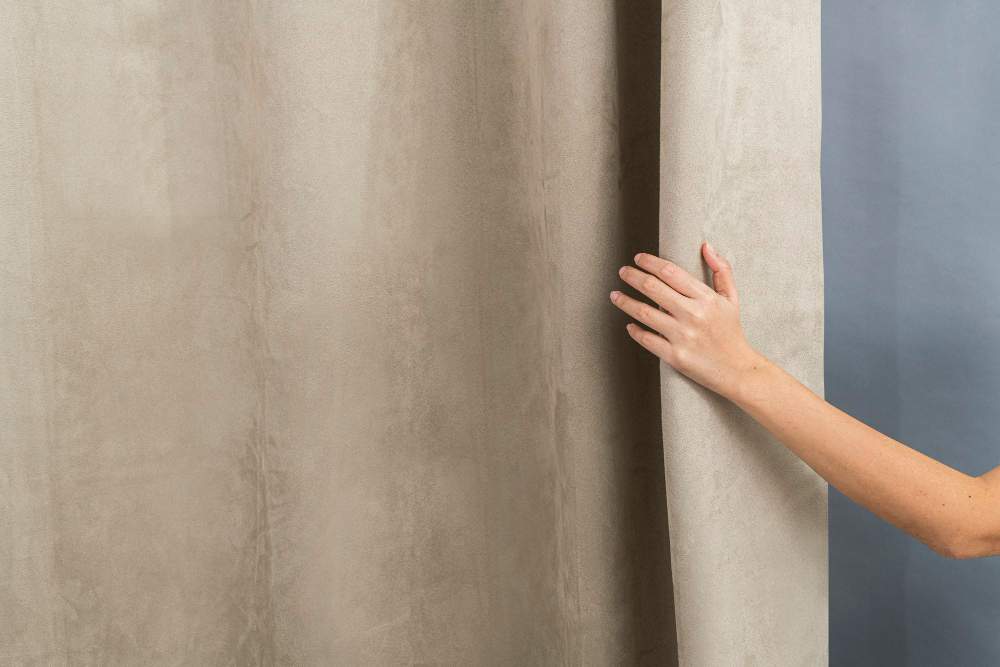Your bathroom is more than just a functional space. It is a canvas for self-expression. As we move into 2023, finding the perfect shower curtain fabric becomes critical to creating a bathroom that reflects your personality. This guide takes you through the diverse world of shower curtain fabrics, helping you make informed choices that go beyond mere functionality.

Why the Right Shower Curtains Fabric Matters
In addition to preventing water splashes, a shower curtain sets the tone for the ambiance of your bathroom. The fabric you choose affects not only the aesthetic appeal but also the durability and functionality of the curtain. Let’s explore the top contenders in the Shower curtains fabric field.

Cotton – The Timeless Classic
Cotton, a perennial favorite, stands out for its versatility and breathability. Ideal for a variety of bathroom styles, cotton shower curtains are easy to maintain and provide a classic, crisp look. Natural fibers allow for breathability, preventing that sticky feeling in your bathroom. Follow our maintenance tips to keep your bathroom looking fresh and stylish.
- Soft, breathable, and natural.
- Ideal for a classic and cozy bathroom style.
- Considered eco-friendly if sourced responsibly.

Polyester
Polyester is usually at the top of all fabric charts. This is due to its high durability. It is a non-biodegradable item with a shelf life of over 100 years. This shows how durable this fabric is.
Polyester – durable and affordable
If durability and affordability are high on your list, polyester is a strong contender. Mildew-resistant and easy to clean, polyester shower curtains are budget-friendly without compromising on style. Perfect for busy households, polyester curtains retain their vibrancy over time.
- Durable, affordable, and moisture resistant.
- Perfect for modern and vibrant bathroom themes.
- Easily customizable with different patterns and colors.

Linen shower curtains are a stylish and functional addition to any bathroom. They are made from natural linen fibers, known for their durability, breathability and moisture-wicking properties.
Linen – Beauty and Luxury
For those seeking luxury, linen shower curtains exude sophistication. The natural texture of linen adds a beautiful dimension to your bathroom. Despite its delicate appearance, linen is incredibly durable and moisture-absorbent, making it a practical yet luxurious choice.
- Elegant and textured, adding a touch of sophistication.
- A chic and timeless bathroom is perfect for the look.
- Requires more maintenance but offers a luxurious feel.

Microfiber – the tech-savvy choice
Step into the future with microfiber shower curtains. A high-tech option, microfiber has water-resistant properties, ensuring dry bathroom floors. Easy to clean and quick to dry, microfiber curtains are perfect for those who prefer convenience without compromising on style.
Tip: If you want to know in depth about different sizes of curtains, follow the link…
Choose the Right Fabric for your Bathroom
When choosing a Shower curtain fabric for the bathroom, consider factors such as durability, moisture resistance, and easy maintenance. Good options include linoleum, ceramic tile, glass, and fiberglass. Each has its pros and cons, so be sure to do your research and choose the one that best suits your needs and budget. It is also important to match the fabric with a matching bathroom vanity or sink cabinet to create a harmonious look. Each fabric has its unique characteristics, so weigh the pros and cons before making a decision. Your shower curtain should not only complement the decor of your bathroom but also fit your lifestyle.
Important factors to consider while choosing bathroom linens:
Moisture resistance: Choose fabrics that can resist moisture and splashes, such as:
- Cotton: Super absorbent and soft, but can get mildew if not dried properly.
- Linen: Durable and naturally moisture-wicking, but can wrinkle easily.
- Microfiber: Quick drying and resistant to mold and mildew.
- Polyester compounds: Often water-resistant and durable.
- Durability: Choose fabrics that can handle frequent washing and resist wear and tear.
- Texture: Consider the desired level of softness and absorbency.
- Style: Select fabrics that complement your bathroom’s overall aesthetic.
Specific Fabric Recommendations for various Bathroom accessories:
- Shower curtains: PEVA or polyester fabric with water-repellent coating.
- Towels: Cotton, linen, or blends for absorbency and softness.
- Carpet: Microfiber or cotton blends for absorbency and quick drying.
- Window treatments: Fabrics that can withstand moisture, such as cotton, linen, or synthetic blends.
Additional tips:
- Wash bathroom linens regularly to prevent mold and bacteria growth.
- Use fabric softener to keep towels and rugs soft.
- Hang shower curtains and towels to dry after each use.
- Consider using a bath mat to absorb water and protect the floor.
Tip: If you want to know in depth about living room curtains, follow the link…
Different Types of Shower Curtains Fabric
In 2023, the trend is towards eco-friendly and sustainable materials that offer both style and functionality. Here are some great shower curtain fabric options to consider:
- Polyester: Polyester is a synthetic fabric that is widely used for shower curtains due to its durability and water-repellent properties. It’s easy to clean and maintain, making it a practical choice for busy households. Polyester shower curtains come in a variety of colors, patterns, and textures, allowing you to easily match your bathroom decor.
- Cotton: Cotton is a natural fiber known for its softness and absorbency. Cotton shower curtains add a touch of warmth and comfort to your bathroom. However, they require more frequent washing and drying to prevent mold growth.
- Linen: Linen is another natural fiber that is gaining popularity for shower curtains. Linen shower curtains are highly durable and water-resistant, making them a long-lasting choice. They have a natural, textured look that adds beauty to your bathroom.
- Microfiber: Microfiber is a synthetic fabric made of very fine fibers. Microfiber shower curtains are highly absorbent and quick drying, making them ideal for bathrooms with poor ventilation. They are also resistant to mold and mildew growth.
- PEVA (Polyethylene Vinyl Acetate): PEVA is a non-toxic, environmentally friendly material commonly used for shower curtains. PEVA shower curtains are waterproof, lightweight, and easy to clean. They come in a variety of colors and patterns, making them a versatile choice for any bathroom.
When choosing a Shower curtain fabric, consider the overall style and decor of your bathroom, as well as your personal preferences for texture, durability, and maintenance. By choosing the right fabric, you can create a stylish and functional shower space that enhances the overall ambiance of your bathroom.
Best Material for Shower Curtain Liner
A shower curtain liner is a waterproof or water-resistant material that hangs inside the shower curtain to prevent water from seeping out of the shower. Shower curtain liners are usually made of plastic, vinyl, or fabric and are available in a variety of colors, patterns, and sizes. Some shower curtain liners also have built-in features, such as mildew resistance, antimicrobial protection, or weighted hems to help keep the liner in place.
Shower curtain liners are an important part of any shower, as they help keep the bathroom dry and prevent water loss. They’re also relatively inexpensive and easy to install, making them a great way to update the look of your bathroom without spending a lot of money.
Here are some additional tips for choosing and using shower curtain liners:
- Choose a shower curtain liner that is the right size for your shower. The liner should be wide enough to cover the entire width of the shower and long enough to reach the floor.
- Make sure the shower curtain liner is made of waterproof or water-resistant material. Plastic and vinyl liners are the most waterproof, while fabric liners are less waterproof but more stylish.
- Consider choosing a shower curtain liner with built-in features, such as mildew resistance, antimicrobial protection, or weighted hems.
- To install the shower curtain liner, hang it inside the shower from the shower curtain rod. Make sure the liner is installed so it covers the entire shower area and the weighted hem (if applicable) is facing down.
- Shower curtain liners should be cleaned regularly to prevent mold and bacteria growth. Most liners can be machine-washed or wiped clean with a damp cloth.
Tip: If you want to know in depth about the best kitchen curtains, follow the link…
Best Fabric for Shower Curtains
When choosing fabric for shower curtains, several factors should be considered, including durability, water resistance, and style. Here are the most commonly used fabrics for shower curtains:
- Polyester: Polyester is a synthetic fabric known for its durability and water resistance. It’s also wrinkle-resistant and easy to clean, making it a popular choice for shower curtains. Polyester shower curtains are available in a variety of colors and patterns, so you can easily match your bathroom decor.
- Nylon: Nylon is another synthetic fabric often used for shower curtains. It is strong and durable, and it also resists water well. Nylon shower curtains are generally less expensive than polyester shower curtains, but they may not be as wrinkle-resistant.
- Vinyl: Vinyl is a waterproof material often used for shower curtains. It is durable and easy to clean, but it can be stiff and may not form as well as other fabrics. Vinyl shower curtains are available in a variety of colors and patterns, but they may not be as stylish as other options.
- Cotton: Cotton is a natural fiber that is absorbent and breathable. However, cotton shower curtains are not waterproof, so they must be treated with a water-repellent coating. Cotton shower curtains can be stylish and add luxury to your bathroom, but they can require more maintenance than other fabrics.
- Linen: Linen is a natural fiber that is strong and durable. Linen shower curtains are absorbent and breathable, but they are not waterproof, so they must be treated with a water-repellent coating. Linen shower curtains can be stylish and add beauty to your bathroom, but they can require more maintenance than other fabrics.
- Silk: Silk is a natural fiber that is luxurious and soft. Silk shower curtains are not waterproof, so they must be treated with a water-repellent coating. Silk shower curtains are the most expensive option, but they can add glamor to your bathroom.
Ultimately, the best fabric for your shower curtain depends on your individual needs and preferences. Consider the factors mentioned above, such as durability, water resistance, and style, to choose the best fabric for your shower curtain.
Maintenance Tips for long-lasting shower curtains
Ensuring the longevity of your shower curtain fabric involves proper maintenance. Regular cleaning, proper drying, and avoiding common mistakes like using harsh chemicals can significantly extend the life of your curtains.
- Regular cleaning: Regular washing of your fabric shower curtain is recommended to prevent mold and mildew from forming. For best results, use a gentle cycle with cool water and mild soap. Be sure to follow the care instructions provided with the curtain or liner. Regular cleaning not only maintains cleanliness but also extends the life of the shower curtain.
- Use a liner: To improve water retention and extend the life of the curtain, consider using a shower liner in addition to a fabric curtain. Liners, usually made of plastic or vinyl, form an additional barrier against moisture, preventing damage to the main curtain.
- Deep Cleaning: Thoroughly clean your fabric shower curtain and plastic liner every few months to ensure longevity and maintain a safe, healthy environment. Deep cleaning helps remove accumulated dirt and ensures a fresh and long-lasting curtain.
- DIY Maintenance: Consider improving your cleaning routine to save and extend the life of your shower curtain. Simple DIY methods can help maintain the quality and appearance of curtains.
FAQs
what is the best remedy for cleaning fabric shower curtains?
The best way to clean fabric shower curtains is to remove them from the hooks and wash them in the washing machine with mild soap and some baking soda to help remove any mold or mildew. It is important to follow the care instructions on the curtain to avoid damage to the fabric. After washing, hang the curtains back to air dry.
What type of material is typically used for water-repellent fabric shower curtains?
Water-resistant fabric shower curtains are often made from materials such as polyester or nylon. These materials are treated with a water-repellent coating to help prevent water from soaking into the fabric and causing mold or mildew.
what is the best fabric to use for shower curtains?
The best fabric to use for shower curtains is polyester due to its water-repellent properties and durability. Cotton blends or nylon can also be suitable options.
What is the cleanest type of shower curtain?
The cleanest type of shower curtain is one that is mold and mildew-resistant, such as polyester or nylon.
What is the safest material for a shower curtain?
The safest material for a shower curtain is one that is water-repellent and resistant to mold and mildew, such as polyester or nylon.
Is linen a good fabric for a shower curtain?
Linen may not be the best fabric for a shower curtain as it can absorb moisture and may require more maintenance to prevent mold and mildew.

